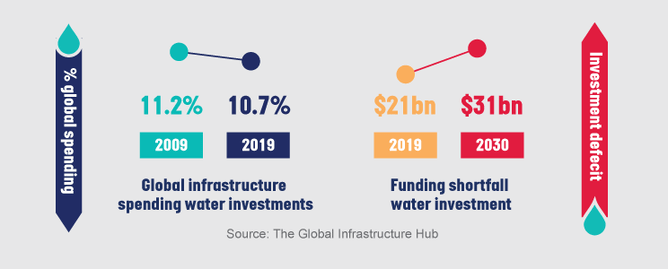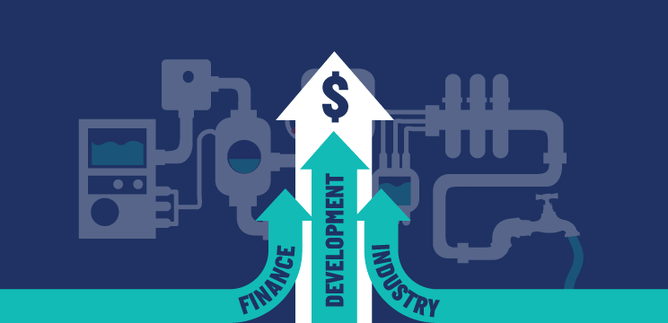By Usha Rao-Monari (Vice-Chair)
Originally posted on LinkedIn:
In preparing to attend the World Water Week gathering in Stockholm, I am encouraged by the growing consensus and recognition of the central role that water plays in all aspects of social and economic development – indeed, it is the foundation upon which all of the United Nations 17 Sustainable Development Goals can be delivered.
Participants from nearly 130 countries and representing over 400 organisations will gather at this unique annual event to share experiences and strategies – and I am personally looking forward to the opportunities to discuss and encourage new investment strategies and approaches that can plug significant funding gaps that remain in the water sector.
The theme of the Week is ‘Water for society: Including all’ – and this theme of inclusiveness highlights some of the central global water challenges that are still faced today. In a world of increasing inequality, water inequality is a fundamental concern and one that impacts all other areas of social and economic exclusion. Issues around finance, infrastructure, governance and ownership models all play a part in impacting access to clean and safe water across the globe – all contributing to the situation today that almost a third of people on earth still live without access to safe running water at home, with 2.4 billion people denied access to basic sanitation services such as toilets or latrines.
These acute water inequality challenges are exacerbated by increasing environmental pollution – with existing consumption and production patterns polluting faster than nature can recycle and purify water in overused rivers and lakes. For example, 70 percent of potentially recyclable plastic in Europe ends up in landfill, in oceans, or are incinerated, releasing further toxins into the environment, and increasing the stresses on both seawater and freshwater ecosystems and increasing freshwater scarcity.
As global water inequality challenges intensify, there is a pressing need to focus on the key obstacles that are still preventing funding to deliver impactful and sustainable solutions to address some of the acute issues of water poverty, sanitation, and plastic pollution.
Funding challenges
With my financier background, I have a particular personal focus on the need for a significant increase in worldwide water investments, targeted to the people who need them most. Yet, if you look at water as one of the infrastructure sectors, traditionally water has received the lowest amount of investment compared to other key sectors. The Global Infrastructure Hub estimate that water investments in 2019 represent a mere 10.7 percent of global infrastructure spending, a figure that is on a downward trend, falling from 11.2 percent in 2009, with today’s water infrastructure funding being a mere 0.23% of global GDP – a funding shortfall of $21bn below identified needs, and a deficit projected to rise to $31bn by 2030.
How can the global water sector tackle this continuing funding challenge? Finding appropriate finance has proven to be very difficult, with the sector dominated by donor aid and concessional capital investments. Vital though these funding sources are, they have very specific requirements and are not always aligned to the funding needs of the water sector – a sector that has a high ratio of ongoing operating costs in comparison with capital expenditure, with very lengthy implementation timelines and revenue streams complicated by governance models, regulation and tariffs.
With existing funding approaches failing to meet the sector’s needs, a new ‘business as unusual’ approach is urgently required. We need to look at new financing approaches, business models and diverse stakeholders to plug this funding gap. Other sectors, such as renewable energy and clean transportation developments, have benefited from innovative funding mechanisms and smart subsidies involving both government and the private sector, to stimulate and encourage infrastructure investment. The water sector globally needs to adopt a similarly innovative and ‘business as unusual’ approach to plugging this funding gap.
Water Unite
Water Unite is in my view an excellent example of one such innovative funding approach. By capturing a tiny fraction of bottled water revenues though a voluntary donation of around one cent per litre from water bottlers and retailers, Water Unite aims to raise up to $200 million in the next two years, with the opportunity to raise billions more collaboration and collective action increases further. With this simple levy, Water Unite is able to plug existing water and sanitation service funding gaps, and through investing in better recycling and reuse schemes in developing countries, address the epidemic of plastic pollution and environmental damage.
The Water Unite approach complements existing donor and capital investments, and includes the essential requirements for longer term and more risk-tolerant capital and grants required for fundamental systems-strengthening that can become independent of aid in order to deliver a truly sustainable approach to safe water access, sanitation and plastics pollution. Water Unite has already received the backing of key industry partners and is helping to finance three important long-term water sector and environmental programs; partnering with the Mozambique based recycling company ‘3R’ (Reduce, Reuse and Recycle); supporting the Nature Conservancy in South Africa to restore the ecological health of Cape Town’s supply watersheds; and Sanitation for Millions, a multi-donor program to improve access to safely managed sanitation and hygiene for refuges in Pakistan, Jordan and Uganda, with special attention given to the needs of women and girls and other vulnerable groups.
Funding Model Innovation
Collaboration between public, private and the third sector is an essential requirement to tackle these interrelated and complex problems, with approaches that span key inputs such as governance, infrastructure and finance required in order to create long-lasting and sustainable solutions. Indeed, I am encouraged by some innovations around governance issues, the recognition of water’s central role in driving economic development, the inter-generational environmental obligation water represents, and the growing sense of urgency for innovation in technology, business models and infrastructure as a means for achieving the UN’s Sustainable Development Goals by 2030.
Water Unite demonstrates the potential of what can be achieved with new innovative thinking around funding. Business as usual will not be enough and fresh approaches are required to examine both new ways of raising scalable finance for the water sector, as well as exploring innovative ways to deploy funds beyond a traditional grant model – ways to make equity investments in projects that are delivering impactful and sustainable water solutions could also be considered. I look forward to sharing some of these ideas, and learning from others, at World Water Week in Stockholm!



